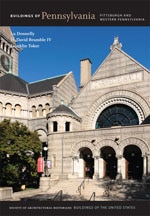
This ensemble of five structures contains homes for Alexander Brewster (1823; 156 E. 5th Street), David Kennedy (1832; 162 E. 5th Street), and Charles M. Tibbals (1842; 146 E. 5th Street), and two sets of town houses built speculatively by David Kennedy, a local mason and brick dealer. All five are red brick two- to two-and-one-half-story houses with Flemish bond facades (except for the Tibbals house). Two houses, the Brewster and the Tibbals, are detached. The successful merchants, who built these town houses with facades nearly flush with the sidewalk, wanted to live close to their work sites. The first story of each of these two houses is raised above street level to provide for basement kitchens. The Brewster house has Italianate touches that were added in the 1850s to its earlier, spare Federal appearance. David Kennedy, who emigrated from Ireland to Erie in 1828, built his own portion of a town house in 1832 and the surrounding brick row houses with Federal detailing. The Tibbals house is a larger, more dignified Greek Revival version of the Kennedy row houses and retains its frame carriage house at the rear. The Stubbins firm restored all the houses and several of them now are used as offices by the neighboring Erie Insurance Group.

